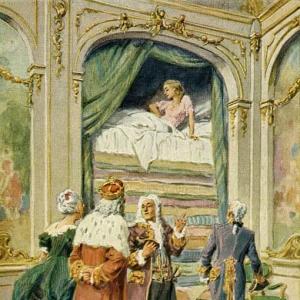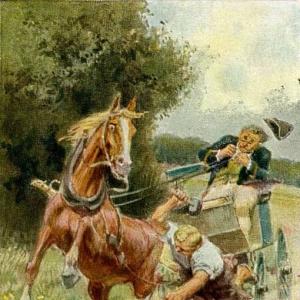Reading time: 11 min
A soldier who is afraid of nothing, troubles himself about nothing. One of this kind had received his discharge, and as he had learnt no trade and could earn nothing, he travelled about and begged alms of kind people. He had an old waterproof on his back, and a pair of riding-boots of buffalo-leather which were still left to him. One day he was walking he knew not where, straight out into the open country, and at length came to a forest. He did not know where he was, but saw sitting on the trunk of a tree, which had been cut down, a man who was well dressed and wore a green shooting-coat. The soldier shook hands with him, sat down on the grass by his side, and stretched out his legs. „I see thou hast good boots on, which are well blacked,“ said he to the huntsman. „But if thou hadst to travel about as I have, they would not last long. Look at mine, they are of buffalo-leather, and have been worn for a long time, but in them I can go through thick and thin.“ After a while the soldier got up and said, „I can stay no longer, hunger drives me onwards; but, Brother Bright-boots, where does this road lead to?“ – „I don’t know that myself,“ answered the huntsman, „I have lost my way in the forest.“ – „Then thou art in the same plight as I,“ said the soldier; „birds of a feather flock together, let us remain together, and seek our way.“ The huntsman smiled a little, and they walked on further and further, until night fell. „We do not get out of the forest,“ said the soldier, „but there in the distance I see a light shining, which will help us to something to eat.“ They found a stone house, knocked at the door, and an old woman opened it. „We are looking for quarters for the night,“ said the soldier, „and some lining for our stomachs, for mine is as empty as an old knapsack.“ – „You cannot stay here,“ answered the old woman; „this is a robber’s house, and you would do wisely to get away before they come home, or you will be lost.“ – „It won’t be so bad as that,“ answered the soldier, „I have not had a mouthful for two days, and whether I am murdered here or die of hunger in the forest is all the same to me. I shall go in.“ The huntsman would not follow, but the soldier drew him in with him by the sleeve. „Come, my dear brother, we shall not come to an end so quickly as that!“ The old woman had pity on them and said, „Creep in here behind the stove, and if they leave anything, I will give it to you on the sly when they are asleep.“ Scarcely were they in the corner before twelve robbers came bursting in, seated themselves at the table which was already laid, and vehemently demanded some food. The old woman brought in some great dishes of roast meat, and the robbers enjoyed that thoroughly. When the smell of the food ascended the nostrils of the soldier, he said to the huntsman, „I cannot hold out any longer, I shall seat myself at the table, and eat with them.“ thou wilt bring us to destruction,“ said the huntsman, and held him back by the arm. But the soldier began to cough loudly. When the robbers heard that, they threw away their knives and forks, leapt up, and discovered the two who were behind the stove. „Aha, gentlemen, are you in the corner?“ cried they, „What are you doing here? Have you been sent as spies? Wait a while, and you shall learn how to fly on a dry bough.“ – „But do be civil,“ said the soldier, „I am hungry, give me something to eat, and then you can do what you like with me.“ The robbers were astonished, and the captain said, „I see that thou hast no fear; well, thou shalt have some food, but after that thou must die.“ – „We shall see,“ said the soldier, and seated himself at the table, and began to cut away valiantly at the roast meat. „Brother Brightboots, come and eat,“ cried he to the huntsman; „thou must be as hungry as I am, and cannot have better roast meat at home,“ but the huntsman would not eat. The robbers looked at the soldier in astonishment, and said, „The rascal uses no ceremony.“ After a while he said, „I have had enough food, now get me something good to drink.“ The captain was in the mood to humour him in this also, and called to the old woman, „Bring a bottle out of the cellar, and mind it be of the best.“ The soldier drew the cork out with a loud noise, and then went with the bottle to the huntsman and said, „Pay attention, brother, and thou shalt see something that will surprise thee. I am now going to drink the health of the whole clan.“ Then he brandished the bottle over the heads of the robbers, and cried, „Long life to you all, but with your mouths open and your right hands lifted up,“ and then he drank a hearty draught. Scarcely were the words said than they all sat motionless as if made of stone, and their mouths were open and their right hands stretched up in the air. The huntsman said to the soldier, „I see that thou art acquainted with tricks of another kind, but now come and let us go home.“ – „Oho, my dear brother, but that would be marching away far too soon. We have conquered the enemy, and must first take the booty. Those men there are sitting fast, and are opening their mouths with astonishment, but they will not be allowed to move until I permit them. Come, eat and drink.“ The old woman had to bring another bottle of the best wine, and the soldier would not stir until he had eaten enough to last for three days. At last when day came, he said, „Now it is time to strike our tents, and that our march may be a short one, the old woman shall show us the nearest way to the town.“ When they had arrived there, he went to his old comrades, and said, „Out in the forest I have found a nest full of gallows‘ birds, come with me and we will take it.“ The soldier led them, and said to the huntsman, „Thou must go back again with me to see how they shake when we seize them by the feet.“ He placed the men round about the robbers, and then he took the bottle, drank a mouthful, brandished it above them, and cried, „Live again.“ Instantly they all regained the power of movement, but were thrown down and bound hand and foot with cords. Then the soldier ordered them to be thrown into a cart as if they had been so many sacks, and said, „Now drive them straight to prison.“ The huntsman, however, took one of the men aside and gave him another commission besides. „Brother Bright-boots,“ said the soldier, „we have safely routed the enemy and been well fed, now we will quietly walk behind them as if we were stragglers!“ When they approached the town, the soldier saw a crowd of people pouring through the gate of the town who were raising loud cries of joy, and waving green boughs in the air. Then he saw that the entire body-guard was coming up. „What can this mean?“ said he to the huntsman. „Dost thou not know?“ he replied, „that the King has for a long time been absent from his kingdom, and that today he is returning, and every one is going to meet him.“ – „But where is the King?“ said the soldier, „I do not see him.“ – „Here he is,“ answered the huntsman, „I am the King, and have announced my arrival.“ Then he opened his hunting-coat, and his royal garments were visible. The soldier was alarmed, and fell on his knees and begged him to forgive him for having in his ignorance treated him as an equal, and spoken to him by such a name. But the King shook hands with him, and said, „Thou art a brave soldier, and hast saved my life. Thou shalt never again be in want, I will take care of thee. And if ever thou wouldst like to eat a piece of roast meat, as good as that in the robber’s house, come to the royal kitchen. But if thou wouldst drink a health, thou must first ask my permission.“
 Learn languages. Double-tap on a word.Learn languages in context with Childstories.org and Deepl.com.
Learn languages. Double-tap on a word.Learn languages in context with Childstories.org and Deepl.com.Backgrounds
Interpretations
Adaptions
Summary
Linguistics
„The Boots of Buffalo Leather“ is a lesser-known fairy tale from the collection of German folk stories compiled by the Brothers Grimm, Jacob and Wilhelm. The brothers were German academics, linguists, and authors who collected and published numerous folk tales during the early 19th century. Their work has had a significant impact on Western storytelling and remains popular to this day.
Their collection, titled „Kinder- und Hausmärchen“ (Children’s and Household Tales), was first published in 1812 and contains over 200 stories. The Brothers Grimm aimed to preserve the cultural and historical heritage of German-speaking regions by collecting these folk tales, which were passed down orally through generations.
The tales in their collection include well-known stories such as „Cinderella,“ „Snow White,“ „Rapunzel,“ „Hansel and Gretel,“ and „Little Red Riding Hood,“ as well as lesser-known stories like „The Boots of Buffalo Leather.“ While many of the Grimm Brothers‘ stories have been adapted into various forms of media, including books, films, and television shows, „The Boots of Buffalo Leather“ remains relatively obscure.
Fairy tales like „The Boots of Buffalo Leather“ often contain moral lessons, fantastical elements, and archetypal characters. They were initially intended for both children and adults, serving as both entertainment and a means to convey important values and cultural traditions.
„The Boots of Buffalo Leather“ can be interpreted in several ways. Here are a few possible interpretations:
The value of courage and resourcefulness: The soldier in the story demonstrates fearlessness and cleverness in the face of danger. His ability to confront the robbers and outwit them using the magical trick highlights the importance of being resourceful and brave in challenging situations.
The power of friendship and loyalty: The soldier and the huntsman form a strong bond throughout their adventure. They support and protect each other, showcasing the power of friendship and loyalty. This bond ultimately leads to a happy ending for both characters, as the soldier is rewarded for his bravery and the huntsman (the King) regains his kingdom.
The importance of humility and recognizing one’s limitations: The soldier initially treats the huntsman as an equal, unaware of his true identity. When he learns the truth, he humbly asks for forgiveness. The King, however, appreciates the soldier’s honesty and values the friendship they have formed. This illustrates the importance of being humble and acknowledging one’s limitations, even in the presence of a higher authority.
The unpredictability of life and the potential for change: The soldier’s life takes a surprising turn when he encounters the huntsman and becomes involved in the robbers‘ capture. This shift in fortune highlights the unpredictable nature of life and the potential for positive change, even when circumstances seem dire.
The theme of justice and retribution: The robbers in the story face the consequences of their actions when they are captured and taken to prison. This outcome serves as a reminder of the importance of justice and retribution in maintaining a well-functioning society.
„The Boots of Buffalo Leather“ is a lesser-known fairy tale from the Brothers Grimm, but it has still inspired a number of adaptations and retellings. Here are a few notable examples.
„The Seven League Boots“: This is a popular variant of the story, where the magical boots enable the wearer to take seven-league strides, allowing them to travel vast distances in a single step. This version of the tale has been adapted into many forms, including a 1952 Disney short film and a 1979 anime series.
„The Elves and the Shoemaker“: This is another fairy tale collected by the Brothers Grimm that shares some similarities with „The Boots of Buffalo Leather.“ In this story, a poor shoemaker receives help from magical elves who create beautiful shoes overnight. The story has been adapted into several stage plays, operas, and even a 1955 Disney short film.
„The Red Shoes“: This is a famous fairy tale by Hans Christian Andersen that also involves magical footwear. In this story, a girl is cursed to dance endlessly in a pair of red shoes, which she cannot remove. The story has been adapted into numerous films, including a 1948 movie directed by Michael Powell and Emeric Pressburger.
„Puss in Boots“: This is another fairy tale that shares some similarities with „The Boots of Buffalo Leather.“ In this story, a clever cat helps a poor miller’s son gain wealth and status by tricking a king into believing that the miller’s son is a wealthy nobleman. The story has been adapted into several films and stage productions, including a 2011 animated film by DreamWorks Animation.
Overall, „The Boots of Buffalo Leather“ has inspired a number of adaptations and retellings that continue to capture the imagination of audiences around the world.
„The Boots of Buffalo Leather“ is a fairy tale by the Brothers Grimm about a fearless soldier who has been discharged from the army. With no trade or means to earn a living, he wanders about begging for alms. One day, he meets a huntsman wearing a green coat, with whom he decides to join forces to find their way out of the forest. They stumble upon a stone house, which turns out to be a robber’s hideout. Despite the dangers, the soldier insists on staying out of hunger.
An old woman living in the house warns them about the robbers, but offers to hide them and give them food if there’s any left. Twelve robbers soon enter the house, and while they’re eating, the soldier makes his presence known, demanding food and drink. Surprisingly, the robbers indulge him, but plan to kill him afterward. However, the soldier uses a magical trick with a bottle of wine, making the robbers freeze in place. He then reveals to the huntsman that the robbers will remain immobilized until he releases them.
After enjoying a feast, the soldier and the huntsman head to town, where they inform the soldier’s old comrades about the robbers‘ hideout. The soldier then releases the robbers from their enchantment, and they are captured and taken to prison. As they approach the town, they discover that a King is returning to his kingdom after a long absence, and everyone is celebrating. The huntsman then reveals that he is the King and thanks the soldier for saving his life.
The soldier, initially alarmed by this revelation, is reassured by the King that he will be taken care of. The King offers him a place at the royal table whenever he desires roast meat and grants him permission to drink a toast, as long as he asks for the King’s consent.
The fairy tale „The Boots of Buffalo Leather“ by the Brothers Grimm is a rich text for linguistic analysis, showcasing various narrative techniques, character dynamics, and thematic elements typical of the Grimm fairy tales.
Here’s a breakdown of some linguistic and thematic features:
Narrative Style and Structure
Oral Tradition Tone: The narrative maintains an oral storytelling style, seen in the direct dialogue and simple, yet vivid descriptions. This style helps convey the tale’s folklore origins.
Third-Person Omniscient Narration: The story is told from an all-knowing perspective, allowing insights into characters‘ thoughts and actions and building suspense.
Dialogue: The use of dialogue is essential for character development and pushing the plot forward. Characters frequently converse, allowing the reader to glean their personalities and intentions.
Language Features
Direct Speech: The story uses a significant amount of direct speech, which creates immediacy and engages the reader. The soldier and huntsman’s exchanges are informal and direct, reflecting their equal footing in the narrative.
Expression and Idioms: The text includes several idiomatic expressions typical of its origin and time, such as „birds of a feather flock together“ and „opening their mouths with astonishment,“ which enhance the storytelling with cultural flavor.
Repetition: There is strategic repetition in phrases and actions, such as requests for food and drink, which emphasize the soldier’s persistence and bold character.
Characterization and Themes
Character Contrast: The soldier and the huntsman (who is revealed as the King) are contrasting characters. The soldier is characterized by his fearless, carefree demeanor, while the huntsman/King is more reserved, only revealing his true identity at the story’s climax.
Courage and Confidence: The soldier’s unwavering bravery and confidence are central themes. His disregard for danger and decorum, demanding food and even engaging with robbers, drives the narrative tension and resolution.
Social Commentary: The tale subtly comments on social hierarchies and valor. The soldier’s ignorance of the huntsman’s true identity emphasizes themes of equality and meritocracy, where actions rather than status define worth.
Transformation and Revelation: The transformation of the huntsman into a King at the end serves as a critical narrative twist, revealing themes of hidden identity and the rewarding of virtue and bravery.
Symbolism
Boots of Buffalo Leather: These boots symbolize strength and resilience. They allow the soldier to „go through thick and thin,“ serving as a metaphor for his adaptability and endurance.
Food and Drink: The repeated focus on food and drink illustrates basic human needs that drive much of the soldier’s actions, representing survival instincts that overshadow fear and propriety.
Hunting Coat and Royal Garments: The huntsman’s attire symbolizes dual identity—the coexistence of his common and royal selves, revealing the story’s theme that true nobility is proven through actions and character.
Conclusion
The tale encapsulates common themes of Grimm’s fairy tales, such as courage, intelligence, and the idea that virtue is rewarded. These themes are enveloped in a narrative rich with linguistic features that bring ancient storytelling traditions to life, making it both a fascinating linguistic piece and a timeless moral narrative.
Information for scientific analysis
Fairy tale statistics | Value |
|---|---|
| Number | KHM 199 |
| Aarne-Thompson-Uther-Index | ATU Typ 952 |
| Translations | DE, EN, ES, FR, PT, IT, JA, NL, PL, RU, TR, VI, ZH |
| Readability Index by Björnsson | 32.3 |
| Flesch-Reading-Ease Index | 80.6 |
| Flesch–Kincaid Grade-Level | 7.1 |
| Gunning Fog Index | 10.1 |
| Coleman–Liau Index | 7.6 |
| SMOG Index | 8.9 |
| Automated Readability Index | 7.5 |
| Character Count | 7.649 |
| Letter Count | 5.832 |
| Sentence Count | 72 |
| Word Count | 1.469 |
| Average Words per Sentence | 20,40 |
| Words with more than 6 letters | 175 |
| Percentage of long words | 11.9% |
| Number of Syllables | 1.833 |
| Average Syllables per Word | 1,25 |
| Words with three Syllables | 70 |
| Percentage Words with three Syllables | 4.8% |

 Facebook
Facebook  Whatsapp
Whatsapp  Messenger
Messenger  Telegram
Telegram Reddit
Reddit














